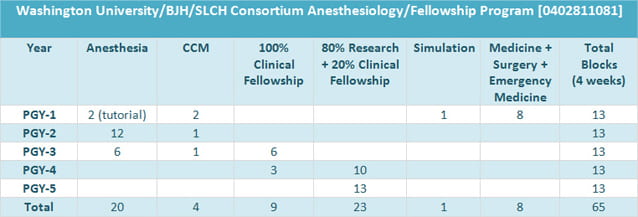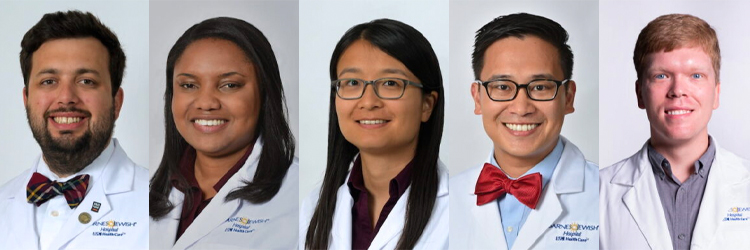The unique postgraduate ASAP training program provides an innovative pathway for “anesthesiologists of the future.”
Program Details
ACGME and ABA-accredited, the Academic Scholars Advancement Program (ASAP) accelerates the careers of physician-scientists in anesthesiology. Graduates of this innovative training program are motivated, highly competent subspecialty consultants, well-positioned to make groundbreaking scientific discoveries and to be contributing members of the academic scientific community.
Graduates of the ASAP track complete training for residency, the fellowship of their choice and nearly 2 years of research time, achieved by combining traditional mentorship with emerging teaching and assessment modalities such as self-reflective learning and high-fidelity simulation.
ASAP track participants select their fellowship at the end of the PGY2 year, after they have rotated through a variety of services and learned more about the subspecialty training opportunities available, including cardiothoracic, pediatric, solid organ transplant, critical care and chronic pain.
The first 3 years of training fulfill the Accreditation Council for Graduate Medical Education (ACGME) and American Board of Anesthesiology (ABA) requirements for core anesthesiology and subspecialty fellowship training.
In the 4th and 5th years of the program, participants spend approximately 80% of their time conducting research with their faculty mentor and the remaining 20% dedicated to maintaining their clinical subspecialty expertise in their chosen area of practice.
Though not required, many program graduates continue on to join the department as faculty.
In addition to completing both residency and fellowship on an accelerated timetable, ASAP participants receive a number of benefits to assist with building a robust research/academic career, including:
- 23 blocks (1 block = 4 weeks) of protected research time during residency.
- Access to 20+ robust basic and clinical science labs within the department and opportunities to work with 400+ PI’s across disciplines throughout Washington University.
- Structured mentorship and support for clinical and academic development.
- NIH T32-supported training.
- Established pathways to support the resident’s transition to independence.

Innovation with Traditional Mentorship
Washington University and the Department of Anesthesiology have a strong tradition of leadership in education and research. We currently have 3 research divisions: the Division of Clinical and Translational Research; the Division of Basic Science Research; and the Division of Pain Research. These research units will provide participants with unparalleled opportunities to pursue scientific interests and develop successful research careers.
How to Apply
To apply for the ASAP track, select “The Academic Scholars Advancement Program (1353040C1)” track in ERAS. In addition to the standard ERAS Application (which should include at least one letter of recommendation from a thesis advisor or research mentor), please submit a one-page statement briefly summarizing your:
- research background
- future research interests
- career plan outline
We offer applicants a dedicated interview day that offers an in-depth look at research opportunities at Washington University and in the department and a detailed look at our department’s research projects, our trainees and scientists, and our infrastructure.
Applying to more than one research track
Applicants often apply to both the ASAP and Washington University Scholars Program and can be considered for both tracks equally. You aren’t required to declare which research track you would like to pursue, rather, we encourage you to rank the tracks in order of your preference.
For additional questions about our ASAP track or to submit a copy of your research statement, please reach out to our Manager of Education Programs, Erin Wood, at erin.wood@wustl.edu.
Frequently Asked Questions
No –our Department is committed to educating the next generation of physician-scientists, by providing all residents a high quality of training that will enable them to thrive anywhere following graduation. Many program graduates have joined our faculty in recent years but there are no expectations that program participants will join the faulty.
ASAP participants often start out with interests in multiple areas. ASAP track participants select their fellowship at the end of the PGY2 year, after they have rotated through a variety of services and learned more about the subspecialty training opportunities available to them within the field of anesthesiology. ASAP track participants have completed fellowships in a wide range of clinical areas including cardiothoracic, pediatric, solid organ transplant, critical care and chronic pain.
